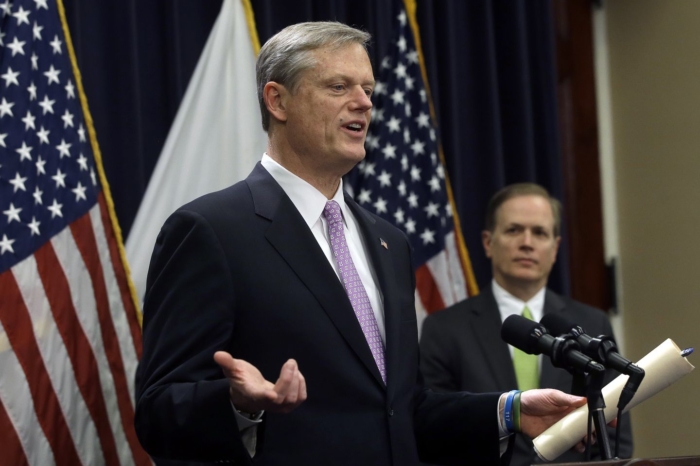Tell state & school leaders to ensure our kids get a quality education this fall!
/0 Comments/in News /by Editorial Staff Share on Facebook
Share on Twitter
Share on
LinkedIn
+
As the coronaviruscontinues in Massachusetts this fall, the education of our children should be atop priority for our state & school district leaders. Many schools didn’tcontinue rigorous instruction during the shutdown.
They didn’t provide dailyschedules, take attendance or ensure daily interaction between teachers andstudents – as a result, our kids lost a third of their academic year.
MA state &district leaders are making school re-opening plans now, that could includeat-home schooling and hybrid options in the fall.
Sign the petition below and tell them that our kids need to continue to learn even if they’re not in a school building.
View our additional education resources:

William & Mary’s Dr. Charles Hobson on Chief Justice John Marshall, SCOTUS, & Judicial Review
This week on “The Learning Curve," co-hosts Cara Candal and Gerard Robinson talk with Dr. Charles Hobson, a retired resident scholar at the William & Mary Law School, 26-year editor of The Papers of John Marshall, and author of The Great Chief Justice: John Marshall and the Rule of Law. Dr. Hobson shares what students should know about the longest-serving, most important chief justice in the history of the Supreme Court, and his influence on our understanding of the U.S. Constitution.

METCO’s Milly Arbaje-Thomas & Researcher Roger Hatch on MA’s Voluntary School Desegregation Program
This week on “The Learning Curve," co-hosts Cara Candal and Gerard Robinson talk with Milly Arbaje-Thomas, President & CEO of the Metropolitan Council for Educational Opportunity, Inc. (METCO) and Roger Hatch, co-author of Pioneer’s report, METCO Funding: Understanding Massachusetts’ Voluntary School Desegregation Program.

NYU Law Prof. Richard Epstein on the Founders’ Constitution & Federalism
This week on “The Learning Curve," co-hosts Gerard Robinson and Cara Candal talk with Richard Epstein, the inaugural Laurence A. Tisch Professor of Law at NYU School of Law, and author of The Classical Liberal Constitution: The Uncertain Quest for Limited Government. He describes the influence of 17th and 18th-century English ideas on our Founding Fathers’ views of ordered liberty and self-government.

Engaged Detroit Founder Bernita Bradley on Homeschooling, Urban Education, & Parent-Driven Reforms
This week on “The Learning Curve," Gerard Robinson and guest co-host Kerry McDonald talk with Bernita Bradley, founder and president of Engaged Detroit, a parent-driven urban homeschooling advocacy coalition.

Jean Strouse on J.P. Morgan & the Rise of American Finance
This week on “The Learning Curve,” Gerard Robinson and guest co-host Kerry McDonald talk with Jean Strouse, author of the award-winning biography of J.P. Morgan, Morgan: American Financier. They discuss why the general public and students alike should know more about the life and accomplishments of the controversial, late 19th- and early 20th-century American banker.

Mt. Holyoke’s Pulitzer-Winning Prof. Joseph Ellis on John Adams & American Independence
This Fourth of July week on “The Learning Curve," co-hosts Gerard Robinson and Cara Candal talk with Dr. Joseph Ellis, Professor Emeritus of History at Mount Holyoke College and author of the Pulitzer Prize-winning book, Founding Brothers: The Revolutionary Generation.

Lead Plaintiff David Carson & IJ Attorney Arif Panju on Landmark SCOTUS Decision Carson v. Makin
This week on “The Learning Curve," co-hosts Gerard Robinson and Cara Candal talk with Arif Panju, a managing attorney with the Institute for Justice and co-counsel in the U.S. Supreme Court school choice case, Carson v. Makin; and David Carson, the lead plaintiff. Panju shares the key legal contours of Carson v. Makin and the potential impact of the Court’s decision in favor of the plaintiffs.

AEI’s Robert Pondiscio on E.D. Hirsch, Civic Education, & Charter Public Schools
This week on “The Learning Curve," Gerard Robinson and guest co-host Kerry McDonald talk with Robert Pondiscio, a senior fellow at the American Enterprise Institute. He shares his background working with curriculum expert E.D. Hirsch, Jr., who has emphasized the importance of academic content knowledge in K-12 education as well as civic education to develop active participants in our democracy. Pondiscio explains some of the findings of his book, How the Other Half Learns, on New York’s Success Academy charter schools network.

Hoover at Stanford’s Dr. Macke Raymond on the Current State of K-12 Education Reform
This week on “The Learning Curve," co-hosts Cara Candal and Gerard Robinson talk with Dr. Margaret “Macke” Raymond, founder and director of the Center for Research on Education Outcomes (CREDO) at Stanford University. She shares some of the major highlights from Hoover’s recent Education Summit that featured a wide variety of national and international experts.

David Ferreira & Chris Sinacola on MA’s Nation-Leading Voc-Tech Schools
This week on “The Learning Curve," co-hosts Cara Candal and Gerard Robinson talk with Chris Sinacola and David Ferreira, co-editors of Pioneer’s new book, Hands-On Achievement: Massachusetts’s National Model Vocational-Technical Schools. They share information from their new book on the story of the Bay State’s nation-leading voc-tech schools, and how accountability tools from the state’s 1993 education reform law propelled their success.

Smith College Prof. Paula Giddings on Ida B. Wells and Her Anti-Lynching Crusade
This week on “The Learning Curve," Cara Candal and guest co-host Derrell Bradford talk with Prof. Paula Giddings, Elizabeth A. Woodson Professor Emerita of Africana Studies at Smith College, and author of A Sword Among Lions: Ida B. Wells and the Campaign Against Lynching.

WV State Sen. Patricia Puertas Rucker on Universal School Choice
This week on “The Learning Curve," co-hosts Cara Candal and Gerard Robinson talk with Senator Patricia Puertas Rucker, a West Virginia state Senator and Chair of the Education Committee. Thanks to her leadership, West Virginia now has the widest, most universal education savings account program in America.



